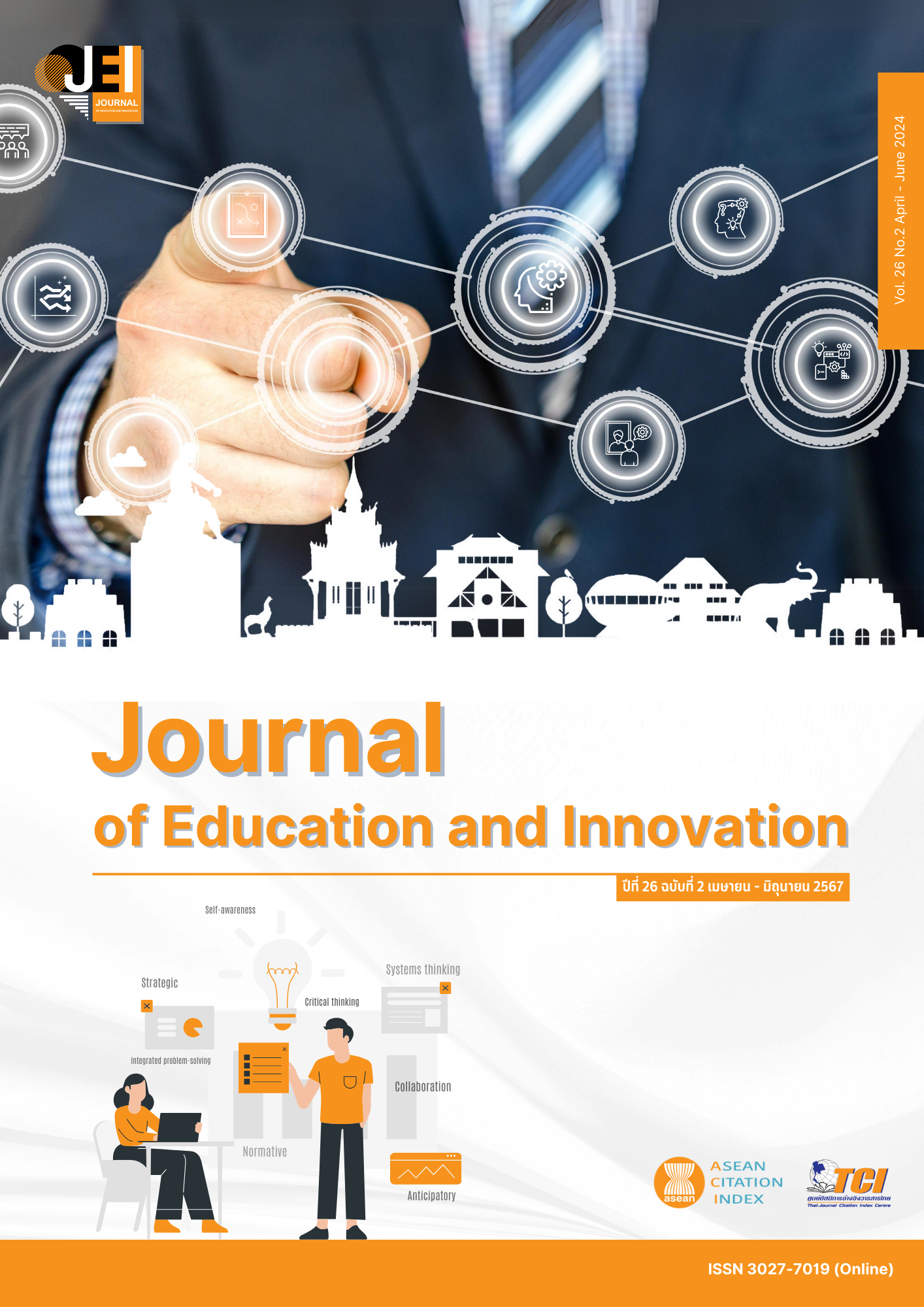การจัดการเรียนรู้แบบสะตีมศึกษาเพื่อพัฒนาความคิดสร้างสรรค์ทางคณิตศาสตร์ เรื่อง รูปเรขาคณิตในลายผ้าทอน้ำอ่าง ของนักเรียนชั้นประถมศึกษาปีที่ 6
Main Article Content
บทคัดย่อ
การวิจัยครั้งนี้มีวัตถุประสงค์เพื่อศึกษาการจัดการเรียนรู้แบบสะตีมศึกษา ที่พัฒนาความคิดสร้างสรรค์ทางคณิตศาสตร์ เรื่อง รูปเรขาคณิตในลายผ้าทอน้ำอ่างของนักเรียนชั้นประถมศึกษาปีที่ 6 ผู้เข้าร่วมวิจัย คือ นักเรียน จำนวน 30 คน ใช้รูปแบบการวิจัยปฏิบัติการ 3 วงจร เครื่องมือที่ใช้ในการวิจัย ได้แก่ แผนการจัดการเรียนรู้ แบบสะท้อนผลการจัดการเรียนรู้ ใบกิจกรรม ชิ้นงานของนักเรียน และแบบทดสอบความคิดสร้างสรรค์ทางคณิตศาสตร์ โดยนำข้อมูลที่ได้มาทำการวิเคราะห์เชิงเนื้อหาและตรวจสอบข้อมูลแบบสามเส้า ผลการวิจัย พบว่า การจัดการเรียนรู้ต้องให้ความสำคัญกับ 1) การตรวจสอบความรู้หรือประสบการณ์เดิมของนักเรียน 2) การใช้สถานการณ์ปัญหาที่นักเรียนพบเจอในชีวิตประจำวันหรือในบริบทชุมชนของนักเรียนและให้นักเรียนสืบค้นข้อมูลจากแหล่งข้อมูลที่หลากหลายและมีความน่าเชื่อถือ 3) การให้นักเรียนร่วมมือกันสร้างความรู้ควบคู่กับการแก้ปัญหา โดยประยุกต์ใช้ความรู้ เรื่อง รูปเรขาคณิตในการออกแบบลายผ้าทอโบราณของชุมชนบ้านน้ำอ่าง จังหวัดอุตรดิตถ์ และเปิดโอกาสให้นักเรียนมีการแลกเปลี่ยนเรียนรู้และให้ข้อเสนอแนะซึ่งกันและกัน เมื่อผ่านการเรียนรู้ครบทั้ง 3 วงจรปฏิบัติการ นักเรียนส่วนใหญ่สามารถพัฒนาความคิดสร้างสรรค์ทางคณิตศาสตร์ในองค์ประกอบของการสร้างความคิดที่หลากหลายได้ดีที่สุด รองลงมาคือ การสร้างความคิดสร้างสรรค์ และการประเมินและปรับปรุงความคิด ตามลำดับ
Article Details

อนุญาตภายใต้เงื่อนไข Creative Commons Attribution-NonCommercial-NoDerivatives 4.0 International License.
เจ้าของบทความมิได้คัดลอก หรือละเมิดลิขสิทธิ์ของผู้ใด หากเกิดการละเมิดลิขสิทธิ์ ไม่ว่าวิธีใด หรือการฟ้องร้องไม่ว่ากรณีใด ๆ ที่อาจเกิดขึ้นได้ กองบรรณาธิการวารสารศึกษาศาสตร์ ไม่มีส่วนเกี่ยวข้องทั้งสิ้น ให้เป็นสิทธิ์ของเจ้าของบทความที่จะดำเนินการ
เอกสารอ้างอิง
Daryanto, J. (2022). Augmented reality media development in STEAM learning in elementary schools. IETA International Information and Engineering Technology Association, 27(3), 463-471.
Dayton, E. (2016). Exploring STEAM: Science, technology, engineering, arts, and mathematics. Project was fund by Sierra Collage CTE Community Collaborative “Sierra STEM” and the California Community College Chancellor’s office. Retrieved June 5, 2023, from https://www.yumpu.com/en/document/view/37252724/pre-build-instructions-and-safety-presentation-sierra-school-works
Institute for the Promotion of Teaching Science and Technology (IPST). (2018). PISA assessment results 2018: What 15-year-old Thai students know and do. Bangkok: Institute for the Promotion of Teaching Science and Technology (IPST).
Institute for the Promotion of Teaching Science and Technology (IPST). (2018). Annual report 2018. Bangkok: Success Publication.
Kijkuakul, S. (2014). Learning management of science: Directions for the 21st century teacher. Phetchabun: Juladis.
Kijkuakul, S. (2018). Quantitative research: A distinguished paradigm and misconceptions. Journal of Education and Innovation, 20(1), 272-282.
Kim, Y., & Park, N. (2012). Development and application of STEAM teaching model based on the Rube Gddbery is invention. Semantic Scholar, 203(1), 693-698.
OECD. (2017). Pisa 2015 collaborative problem-solving framework. Paris: OECD.
Paerat, P. (2023). The development of learning implementation based on mathematical models in sufficiency economy context to enhance creativity thinking in the topic of ratio proportion and percent of Grade 7 (Master thesis). Phitsanulok: Naresuan University.
Panichwilai, S. (2023). Math labs based on social constructivist together with GeoGebra to enhance mathematical creativity thinking on circle of student in grade 9 (Master thesis). Phitsanulok: Naresuan University.
Pongern, W. (2017). The development of instructional model base on STEAM to enhance technological innovation creativity skills of secondary students (Master thesis). Nakhon Pathom: Silpakorn University.
Santipaiboon, J. (2018). Learner’s development activities by STEAM and productivity based learning to enhance the process skills and creative ability in third grade students (Master thesis). Nakhon Pathom: Silpakorn University.
Wongcharee, P. (2018). Implementation of STEAM Education in topic of forces movements to promote and innovation for grade 5 student (Master thesis). Phitsanulok: Naresuan University.


